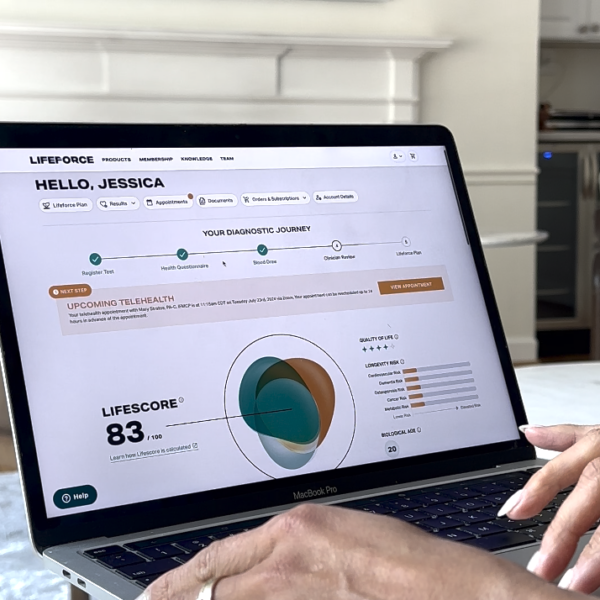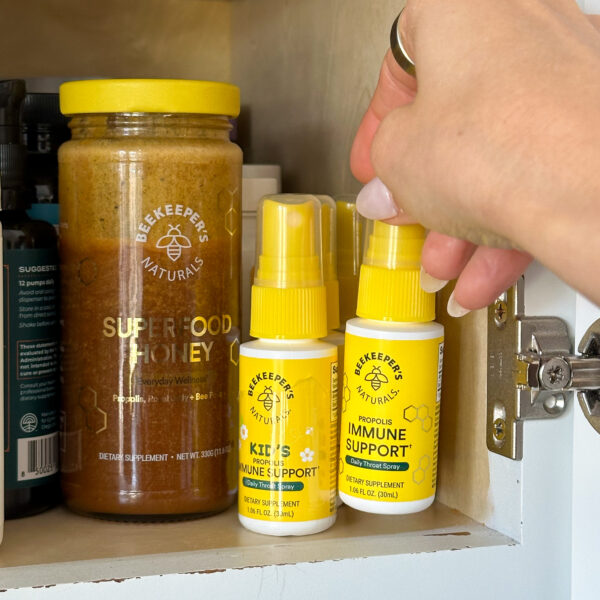A few of the many ways to improve digestion and reduce bloating. Ultimately improving digestion means nourishing your gut microbiome daily.

One of the biggest issues I’ve been seeing is the normalization of bloating. For the record, constant bloat is not normal. Bloating is a symptom and a signal that your digestive system isn’t functioning optimally.
Now occasional bloat and gas can happen. Maybe your digestion is altered due to stress, eating too quickly, lacking enough digestive enzymes, or not being hydrated enough. But this happens every once in a while and you can quickly recover. This all boils down to optimizing your digestion and maintaining a healthy gut. Ideally, you want to support digestion on a daily basis so that you are preventing gas and bloat in the first place.
Your digestive health plays a huge role in how you feel. Think about it. If you’re constantly bloated, constipated, have abdominal cramping, gas, or diarrhea on the regular, think about how lousy you feel. And you deserve to feel nothing short of amazing!
Here are a few simple ways to improve digestion and reduce bloating daily.
Chew Your Food
Slowly chew your food. The number one reason I find people are feeling bloated is that they aren’t chewing their food properly. Digestion begins in our mouths. Your teeth need to do the heavy lifting, not your stomach. When we don’t chew our food completely, it leaves more work for our stomachs, which can result in bloating, gas, gurgling, and acid reflux, just to name a few. You want to make digestion as easy as possible by crushing your food up as much as possible.
This is where eating mindfully comes into play. How often do you find yourself eating while scrolling on your phone, reading emails, or hovering over the kitchen counter? Rather than scarfing down your meal, try to incorporate mindfulness practices into your meal routine. Before you eat, take three deep breaths to slow your mind and make you more aware of your food. Eat in a seated position and chew thoroughly, aiming for about 20 times per bite. This can take a while to get used to (I’m still working on it too!). But it can make a huge difference in reducing bloat!
Sip on Tea
Herbal teas are a great way to support digestion. Traditionally, people have used natural remedies like herbal teas to relieve bloating. Sipping a digestive tea blend, especially one that includes ginger, after meals is a great way to create a daily ritual that supports your digestive health. Remember we want to support our digestive health daily.
Ginger is one of the best ingredients to incorporate in a tea because of its anti-inflammatory properties. Because ginger alleviates discomfort and protects the stomach lining, it can help with bloating, nausea, pain, and more.
My favorite tea to incorporate for digestion and reducing bloat is the Daily Detox from Steep Into It. It’s a simple, yet effective organic blend of Lemongrass, Ginger, Dandelion Root and Milk Thistle. This specialized blend of premium herbs are excellent caffeine-free stimulants that boost energy and detoxification, providing support to the liver and digestion.
Steeping a hot cup of Daily Detox after lunch has become one of my daily rituals that supports digestion and detoxification, both of which are important for hormone health. Plus, pouring a cup of tea and sipping it slowly feels like a sacred pause that helps me reduce stress before taking on the rest of the day.
Use the code NBN15 for 15% off your wellness teas and mushroom elixirs.
Cook Your Veggies
While I’m a fan of incorporating a variety of vegetables, both cooked and raw, too many raw veggies can be harder for your body to digest. This is especially true if you’re not chewing your food thoroughly. If you are struggling with gas after eating raw veggies, especially heartier greens or cruciferous veggies like broccoli, cauliflower or Brussels sprouts, try steaming or sautéing them. Softening the veggies up prior to eating means less work for your mouth and the rest of the digestive tract
Stay Hydrated
Chances are you aren’t drinking enough water. In fact, more than __ people are mildly dehydrated. Staying well hydrated is essential for a smooth moving digestive system. Even if you’re eating for optimal digestive health and loading up on fiber-rich plant-based foods this can cause issues without enough water. A high fiber diet without enough water can cause constipation, bloating and even malabsorption. Water helps break down food items to promote optimal digestion and also softens the stool.
One of the best things you can do is start your day hydrated. Before drinking coffee, make yourself a mug of warm water with lemon and fresh ginger. Warm water helps to stimulate digestion, while ginger and the lemon aid digestion. This provides immediate digestive relief and helps rehydrate after a night’s sleep.
Manage Stress
Bloating isn’t always the result of what you’re putting into your body. Acute and chronic stress can trigger a variety of symptoms throughout your body, including digestive issues like bloating.
Acute stress or short term stress is situational and happen periodically like when you realize you over scheduled yourself, you have an upcoming exam or got a poor night’s sleep. When we eat while stressed it can make it hard to digest your food, leading to that uncomfortable bloat.
This happens because when you’re stressed, your body is in fight-or-flight mode. Your body pumps out cortisol and slows down or even stops digestion so your body can handle the perceived stress or “threat”. Now think of what happens to your digestive system when you’re living in constant stress? It’s bad news for your digestive health.
Managing stress is essential for optimal health but especially optimal digestion. Some natural ways that are proven to reduce stress include getting a better sleep at night, low-intensity exercising, and meditation. You can also start by taking a few deep belly breaths before you eat. This can help calm the nervous system, so you’re not in that fight-or-flight mode while you’re eating.
It’s also best to stay as relaxed as possible while eating. Eating mindfully, without distractions (aka put your phone and computer away!) Activates the parasympathetic nervous system or your “rest-and-digest mode”, when intestinal activity increases.
Keep in mind!
These are just a few of the many ways to improve digestion and reduce bloating. Ultimately improving digestion means nourishing your gut microbiome daily. But if you’re experiencing gas, bloat or other GI symptoms with almost anything you eat that’s a red flag. If you have been experiencing bloat and discomfort for a prolonged period and it doesn’t ease up after diet or lifestyle changes, you may dig deeper for root causes.
I recommend finding a holistic medical practice that will help get to the root cause of your constant bloat and digestive issues. From there you can work with a dietitian or make the necessary nutrition and lifestyle changes so that you can feel your best, bloat-free!




I think staying hydrated throughout the day is one of the most important factors to limiting bloating. Also limiting the amount of red meat in a diet can help. So true as you have mentioned, stress is the main culprit. Thank you for an excellent read.